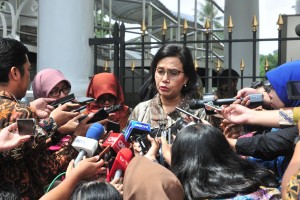Govt Sets 2020 Economic Growth Target at 5.6%

Minister of Finance Sri Mulyani Indrawati answers questions from the journalists after attending the Plenary Cabinet Meeting at Bogor Presidential Palace, West Java, Tuesday (23/4). Photo by: Jay/PR.
The main policy in drafting the State Budget aims to boost investment and exports, particularly through improving the quality of human resources and maintaining infrastructure development, according to Minister of Finance Sri Mulyani Indrawati.
For the record, the Government since last February has been drafting budget ceiling for the 2020 Draft State Budget (RAPBN) for all Ministries and Institutions.
“The President has instructed us to streamline the budget, particularly in terms of goods procurement, and to increase budget allocation for development policies, including capital expenditure, human capital expenditure, and infrastructure expenditure,” Sri Mulyani told the journalists after attending the Plenary Cabinet Meeting at Bogor Presidential Palace, West Java, Tuesday (23/4).
President Jokowi, according to Sri Mulyani, also requested bureaucratic efficiency to generate export investment through various kinds of incentives, including fiscal incentives and service for investors.
“Based on the guidelines and of the various programs such as Staple Food Card, Smart Indonesia Card for College Students and Pre-Employment Card, we start drafting budget allocation for 2020,” the Minister said, adding that the Governments macroeconomic assumption for economic growth is 5.3%-5.6%.
The President expressed his hope that we can achieve 5.6% (economic growth) Sri Mulyani said.
Sri Mulyani went on to say that inflation is still maintained between 2% and 4%, interest rate between 5% and 5.3%, exchange rate between Rp15,000/US$ and Rp14,000/US$, oil prices between US$60 and US$70 (per barrel) and oil and gas lifting is roughly equivalent to todays production.
The Minister explained that the Cabinet Meeting focused on accommodating and coordinating priority programs such as Staple Food Card, Smart Indonesia Card for College Students and Pre-Employment Card and that the Government will merge Staple Food Card, Aspiring Family Program and Non Cash Food Assistance into one card to support communities in obtaining affordable daily needs.
Regarding Social Security Provider Body for Health (BPJS Kesehatan) Sri Mulyani said that the Government will conduct a review based on the audit from the Finance and Development Supervisory Agency (BPKP).
“The Government is considering raising the health insurance premium subsidy for disadvantaged groups, but the exact number has not determined. We will also increase the number of subsidy recipients to more than 100 million people,” the Minister explained.
On the infrastructure, Sri Mulyani said that the Government will provide more roads, especially arterial roads, collector roads in regencies and municipalities and roads in tourist destinations.
“Ten areas have been set (as new tourist destinations) and four of them must be completed by 2020, in terms of infrastructure facilities (public facilities and social facilities). The four tourist destinations are Borobudur, Toba, Mandalika, and Labuan Bajo,” Sri Mulyani said.
Regarding the engine of economic growth, Sri explained that the main factor is consumption. To achieve 5.6% economic growth, according to Sri Mulyani, growth from investment should be close to 7.5%, export growth should be approximately 7% and import growth should be around 6%.
“That is the demand aggregate composition. On the supply side, we hope that the productivity of each sector, including agriculture, and especially manufacturing, to grow at a higher rate,” Sri Mulyani continued.
Sri Mulyani further said that the President wants the reduction of goods procurement to be based on the 2015 baseline, which was Rp233 trillion.
“The President and the Vice President will use the fiscal space to support the capital expenditure budget, including for Minister of Public Works and Housing, Minister of Transportation, as well as Minister of Energy and Mineral Resources,” Sri Mulyani concluded.
Translated by: Ridwan Ibadurrohman
Edited by: Yuyu Mulyani








